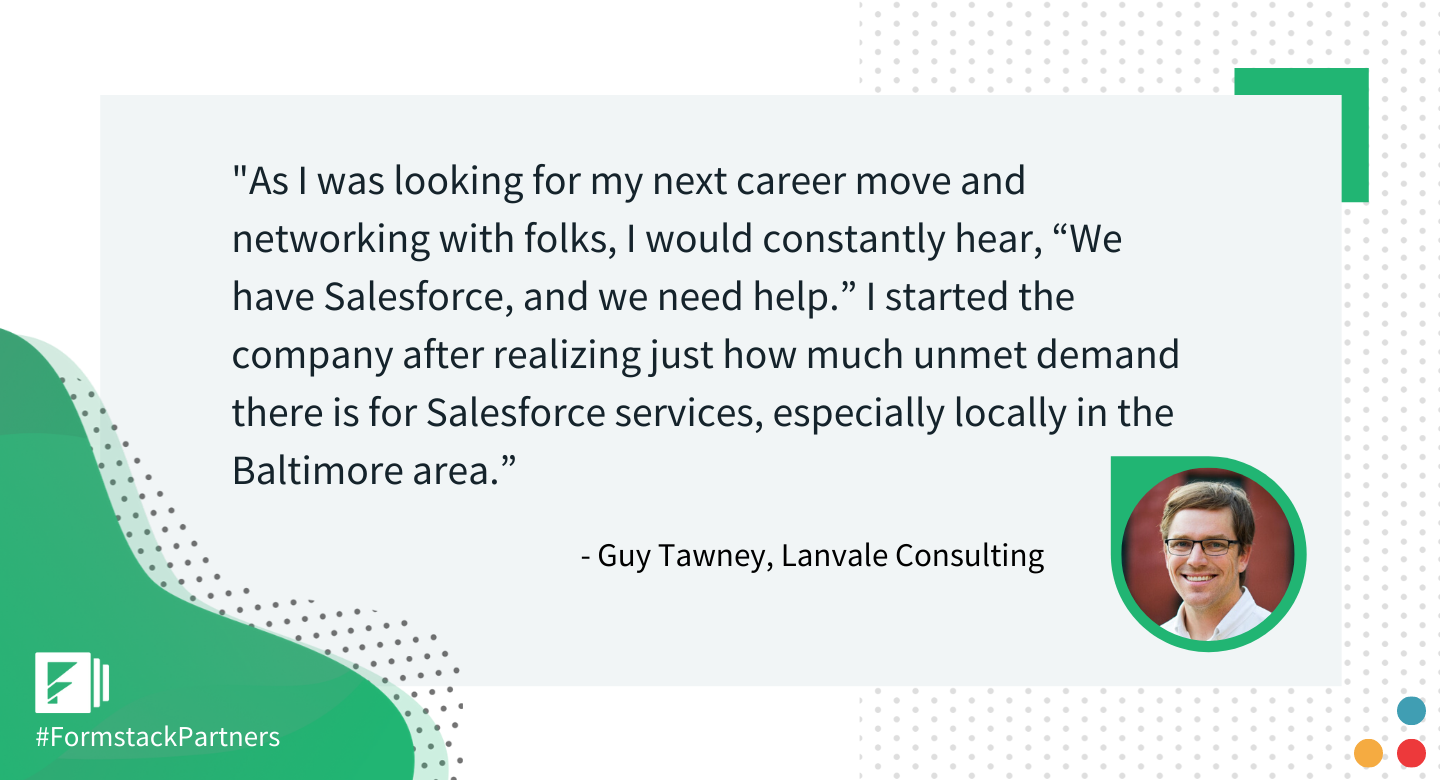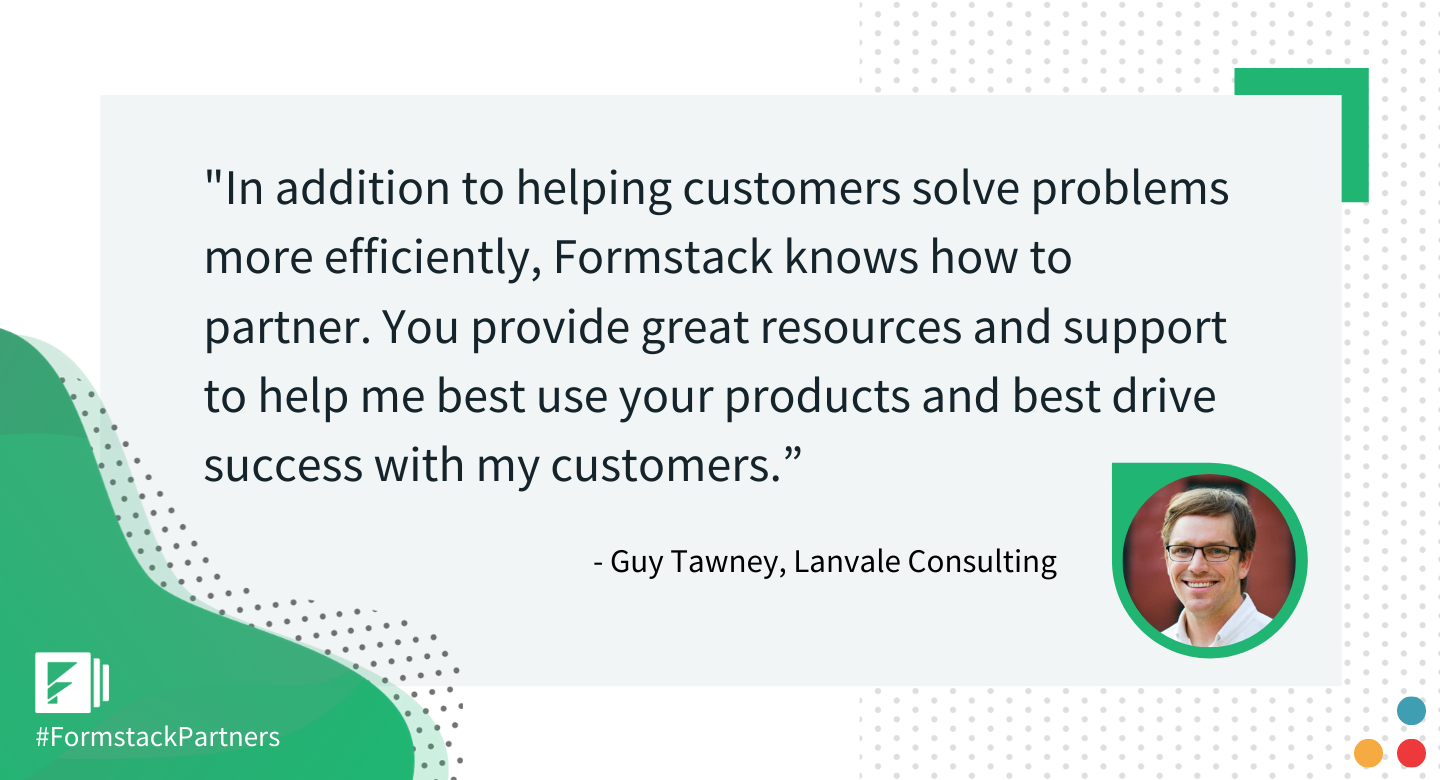Our VP of Partnerships Zak Pines recently sat down with Guy Tawney, Founder and President of Lanvale Consulting, as part of our ongoing Partner Interview Series. Zak and Guy had a far-ranging conversation that touched on the Salesforce scene in Baltimore; driving Salesforce adoption by simplifying data input; and how Guy named Lanvale Consulting. Here’s an abridged transcript of the chat.
Background on Lanvale Consulting & Salesforce
Zak: Can you start by telling us about Lanvale Consulting?
Guy: Absolutely. Lanvale Consulting just celebrated our one-year anniversary, and we offer a full suite of Salesforce consulting services—from initial implementations to enhancements to existing org’s data migration, integrations, and training. We are focused on SMB customers, although a number of our clients are teams within larger corporations who maintain their own Salesforce org.
We love the process of working with a client, developing a deep understanding of their business, and translating that into a Salesforce solution. We judge our success primarily on the level of efficiency we create for our clients.
Zak: What was your background prior to starting Lanvale Consulting?
Guy: I come from a commercial real estate background. I used to be a broker with CBRE, then worked for a PE firm that owns and operates commercial real estate around the world.
Initially, many of my clients were commercial real estate companies. As we’ve gone along, we’ve also grown a local focus in the Baltimore area where we are based. We’ve found the Baltimore area is underserved around Salesforce services, so we have been filling that gap. That has also brought us into additional industries, including tech startups, nonprofits, and medical device sales, amongst others.
Zak: How did you first get introduced to Salesforce?
Guy: About seven years ago, when I was working as a commercial real estate broker. We were using Salesforce to manage one of our accounts, and I became the accidental admin.
Zak: Ah. I’ve heard that term used throughout our partner interview series. There’s many accidental admins out there.
Guy: Yep, it was my job to figure it out as we went along. We started working with additional Salesforce orgs for other accounts. And then as I went to the PE firm, Salesforce became a larger part of my responsibilities.
Zak: What led you to start Lanvale Consulting?
Guy: As I was looking for my next career move and networking with folks, I would constantly hear, “We have Salesforce, and we need help.” I started the company after realizing just how much unmet demand there is for Salesforce services, especially locally in the Baltimore area.

Zak: How are you typically finding your new customers?
Guy: Initially, our foothold was in a few strategic partnerships with groups like Formstack, whose clients often need a Salesforce expert to help fully leverage their tools. After we established these initial channels and clients, most of our business has come from repeat clients, referrals, and direct networking.
Driving Salesforce Adoption by Simplifying Data Input Processes
Zak: Do you recall when you discovered Formstack, and specifically our native Salesforce forms product on the AppExchange?
Guy: We had a need for a client to provide a solution that allows a variety of different people to enter data into Salesforce, and these people who need to enter data may or may not have a login. When we reviewed different ways to accomplish this with form tools, our customer felt most comfortable using a product native to Salesforce. They didn’t want to have to log in to multiple systems. They didn’t want to have to collect data in separate systems and worry about mapping fields or syncing data.
They felt that the native form builder approach aligned well to their vision of Salesforce as their single source of truth.
Zak: What were the important criteria you had for the solution, in addition to being native to Salesforce?
Guy: We looked at how easy it was to take a form and adapt the form and user interface to be hosted on the site. This is something that Formstack excelled at. It’s intuitive and feels simple.
The other functionality we came to really appreciate it dynamic prefill. Because it’s using existing data and matching fields to Salesforce, you end up with consistent data that furthers Salesforce as the single source of truth.
Zak: What you described earlier—entering data external to Salesforce—is a strong fundamental use case.
Guy: Customers have non-Salesforce users who contribute to their data, and a Formstack form is an easier way to enter data.
We have a client who’s tracking orders for the product they manufacturer. They rolled out a form to their internal team, and when that form is filled out, it creates and updates multiple objects in Salesforce—the opportunity, the order, the relationship between the product and the order, etc., etc.
It’s way easier to set up the Formstack form with the rules that you want to happen and then just allow users to enter information to the form vs. having to deal with jumping between many, many screens in Salesforce.
Zak: Oh, so it’s a form used by their internal team. That’s interesting.
Guy: Yes, that’s an advantage that I didn’t originally anticipate. We originally focused on external users who didn’t have Salesforce accounts, as a means for them to provide data inputs for Salesforce.
Then we realized it makes it much easier for internal users to enter information. It’s a huge step towards getting adoption.
Adoption happens when the tools make everyone’s lives easier. And it’s much easier to fill out a single Formstack form than having to deal with multi-step, multi-object processes across multiple screens within Salesforce. Formstack also tends to be something our clients are more comfortable maintaining themselves as compared to a Screen Flow solution.
Salesforce + Formstack Use Cases: Applications, Renewal Processes, & More
Zak: What are some specific use cases for using Formstack’s Salesforce app? What types of forms?
Guy: Volunteer applications is a good one. We have a client who has extensive criteria, so there are conditional questions to match the volunteer to the program based on their skill set and experience.
The list is fairly endless, though. I could go on and on. Tenant leasing applications. Collecting contractor bids. We have another nonprofit group who sells year-long memberships. We’ve had a lot of success managing the purchase and renewal of those memberships through Formstack forms.
Zak: Renewal process...interesting. Tell me more about that.
Guy: Between Formstack and Salesforce, we have email reminders to members as their memberships are due to expire, with links to facilitate renewal. We use data prefill to prefill data on the form, so the member just needs to review and verify. Everything else required to renew the membership is there.
So it’s quick and efficient. Prior to this, it was all managed in Excel, so the person managing the process needed to reach out to each person as their membership was due to expire. They were processing credit card information by hand.
Now it just happens automatically without anyone needing to spend time on it, and their staff are able to spend their time doing more meaningful work.
Zak: Sounds like the proverbial win-win.
Guy: Yes, they now can track their renewal rate, and it’s up from before because it’s a much easier process for the member. And they are spending less time on it because it’s automated through Salesforce and Formstack.
Zak: What stands out to you about working with Formstack?
Guy: In addition to helping customers solve problems more efficiently, Formstack knows how to partner. You provide great resources and support to help me best use your products and best drive success with my customers.

Lightning Round
Zak: What are some of your personal interests or hobbies?
Guy: My biggest hobby is cycling. For years, I was a competitive amatuer cyclst. I still get out there a fair amount.
Zak: Do you have a favorite productivity tip you can share?
Guy: I find that I’m better at doing complicated work later in the day. In the morning, I knock out miscellaneous administrative items and build up to the bigger exercises.
Zak: What is your favorite TV show?
Guy: I don’t watch a ton of TV. My wife and I have gotten into binge watching episodes of “The Late Show with Steven Colbert.”
Zak: What is your go-to lunch during the workday?
Guy: I normally whip up a pretty typical deli sandwich.
Zak: Speaking of sandwiches, is a hot dog a sandwich?
Guy: I saw this on your list of questions from other interviews, so I had time to think about it. A hot dog is a very basic sub, which is kind of like a subcategory of sandwiches.
Zak: Wow, that makes a ton of sense. And nice job doing your research. I just remembered one last question for you. Where did the name Lanvale Consulting come from?
Guy: Lanvale is the street I grew up on in Baltimore.
Zak: Oh, that is fitting.
Looking for your next step? Check out Formstack’s partner program for consultants, agencies, and tech partners.











